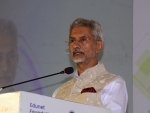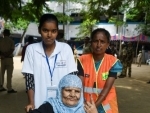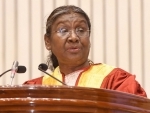 India-Russia
India-Russia Forging global security: Insights from India-Russia dialogue and SCO Meeting
Indian National Security Advisor Ajit Doval conducted a series of bilateral meeting on the sidelines of the XII International Meeting of High Ranking Officials Responsible for Security Matters in St. Petersburg, Russia.
His meeting with his Russian counterpart provided an opportunity for both sides to assess the advancements made in bilateral cooperation and deliberate on significant matters of mutual interest.
The wide-ranging bilateral discussion with Celso Amorim, the Chief Advisor to the Brazilian president, covered a range of topics including bilateral, regional, and global matters of mutual concern.
During the luncheon meeting of BRICS NSAs, hosted by the Russian Security Council's Secretary earlier in the day.
NSA Doval emphasized the necessity for enhanced collaboration in combating terrorism and advocated for concrete measures to thwart the cross-border planning, financing, and execution of terrorist activities.
A bilateral discussion was held also with Admiral Moe Aung, of Myanmar.
The conversation encompassed the prevailing situation in Myanmar and India's infrastructure projects funded in the country. Furthermore, both sides addressed recent developments along the India-Myanmar border, delving into matters concerning security, refugees, and ongoing development projects.
India's commitment to using digital technologies for inclusive economic growth was highlighted at a session on information security during the XII International Meeting of High Ranking Officials Responsible for Security Matters. India advocated for international collaboration to establish a framework for information security that is open, stable, secure, reliable, and accessible to all.
The roadmap for such cooperation should encompass several key elements: involvement of all stakeholders ranging from Governments to the Private Sector, Academia, Technical Communities, and Civil Society; nurturing regular institutional dialogues to foster a shared understanding of critical issues; facilitating capacity building among like-minded nations through training, education, awareness programs, and the development of security standards for emerging technologies; and establishing mechanisms for cooperation at both domestic and international levels.
India's resolve to collaborate in countering the misuse of information and communication technologies by terrorists and criminals, as well as combating terror funding, was underlined in unambiguous terms. In this regard, the importance of initiatives such as the UN Convention on cybercrime at the international level was emphasized.
India's unequivocal condemnation of terrorism in all its forms resonates deeply with one of the core objectives of BRICS. The BRICS coalition, comprising Brazil, Russia, India, China, and South Africa, has intensified its vigilance against terrorism in recent years. They recognize it as a major threat to global peace and security.
BRICS nations have consistently denounced terrorism in all its manifestations, irrespective of ideology or religion. They advocate for a united global front against terrorism and emphasize the importance of international cooperation. The group supports the Comprehensive Convention on International Terrorism (CCIT) but acknowledges the lack of consensus on its definition of terrorism.
BRICS established a working group on counter-terrorism and hold annual meetings for National Security Advisors. This allows for joint planning, intelligence sharing, and collaboration on issues like terror financing. They also recognize the role of the internet in recruitment and propaganda, calling for cooperation on information security and countering the misuse of technology.
The BRICS declaration in 2016 included "dismantling terror bases," reflecting India's concerns about cross-border terrorism. They have expressed support for Afghanistan's stability and peace efforts, a region critical to several BRICS members. The grouping has condemned the violence perpetrated by terrorist groups like ISIS, Boko Haram, and Al-Shabab.
As the BRICS build their global influence, they are expected to maintain their strong stance against terrorism. Continued collaboration is crucial to address emerging threats like the use of chemical, biological, or nuclear weapons by terrorists. Finding a balance between internet security and citizen privacy is a challenge the BRICS nations must address.
The BRICS grouping represents a significant portion of the world's population, especially young people. By working together and finding common ground, they can develop effective strategies to combat terrorism and build a more secure future.
India and Russia have a long history of close partnership, lasting more than 50 years, built on mutual support, especially during difficult times. India strongly condemned the brutal terrorist attack at Crocus City Hall in Moscow on March 22 and urged for a unified approach without double standards in combating such atrocities. Earlier this month, the national security advisors of India and Russia met on the sidelines of the 19th annual meeting of the secretaries of security councils of the Shanghai Cooperation Organization (SCO) member states in Astana where India expressed unwavering support to the government and people of Russia in confronting the menace of terrorism in all its forms and manifestations, emphasizing the imperative of effectively and swiftly addressing the perpetrators of terrorism, including those involved in cross-border terrorist activities.
Terrorism also took center stage at the 19th annual meeting of the secretaries of security councils of the Shanghai Cooperation Organization (SCO) member states, held recently in Astana. The participants concurred on the intricate and volatile nature of the current international security environment, where traditional and non-traditional threats are intricately interwoven. The escalating geopolitical risks, combined with the dynamic evolution of terrorism, extremism, and separatism, pose grave dangers to both global and regional peace and stability.
Underlining the imperative of combating terrorism, the SCO pledged to enhance cooperation among member nations in this critical endeavour. The meeting delved into strategic discussions aimed at countering terrorism, extremism, and separatism, while also prioritizing collaborative efforts to address contemporary threats and challenges, including those related to regional security concerns.
During the meeting, India emphasized its commitment to maintaining peace, stability, and security within the SCO region, stressing the importance of a strong stance against terrorism in all its forms, highlighting its detrimental impact on the prosperity and development of SCO member states, reiterating India's long-standing proposal for a comprehensive international treaty on terrorism at the United Nations.
The Indian delegation highlighted India's concept of "Security and Growth for All in the Region" (SAGAR), which promotes cooperation and shared prosperity within the Indo-Pacific region.
After the meeting, a protocol was signed, likely signifying an agreement on a key aspect of SCO cooperation. Additionally, a joint statement in the form of a communique was issued, detailing several initiatives that the SCO member states committed to pursuing.
One particularly notable initiative outlined in the communique is the conception of "One Earth, One Family, One Future." This concept seems to draw inspiration from the ancient Indian philosophy of "VasudhaivaKutumbakam," meaning "the world is one family." This underscores an emphasis on fostering unity and collaboration among SCO member states.
In conclusion, the India-Russia security dialogue underscored collaborative efforts against terrorism and the volatile international security scenario. Indian NSA AjitDoval's engagements emphasized enhanced cooperation in countering cross-border terrorism and leveraging digital technologies for inclusive growth.
The SCO meeting in Astana echoed these sentiments, highlighting the urgent need for joint action in addressing evolving security threats.
The signing of protocols and joint statements reflects tangible progress in SCO collaboration. Initiatives like "One Earth, One Family, One Future" signify unity amidst global challenges. Continued strategic dialogue and cooperation are essential for ensuring peace, stability, and prosperity in the region and beyond.
(About the author: Dr. Maheep is an eminent scholar of International Relations and Global Politics. He has been teaching and conducting research in the area of his interests for over a decade)
Support Our Journalism
We cannot do without you.. your contribution supports unbiased journalism
IBNS is not driven by any ism- not wokeism, not racism, not skewed secularism, not hyper right-wing or left liberal ideals, nor by any hardline religious beliefs or hyper nationalism. We want to serve you good old objective news, as they are. We do not judge or preach. We let people decide for themselves. We only try to present factual and well-sourced news.







